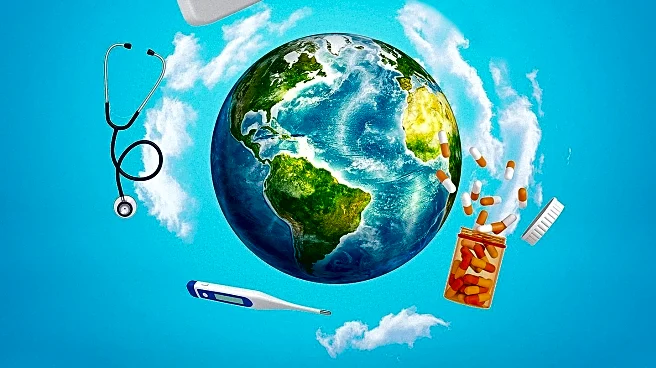What is the story about?
What's Happening?
Antibiotic resistance has emerged as a significant global health threat, with the United Nations labeling it as one of the most urgent issues facing humanity. The phenomenon occurs when bacteria evolve to withstand the effects of antibiotics, rendering treatments ineffective. This resistance is estimated to cause over a million deaths annually, a number expected to rise. Despite the critical need for new antibiotics, discoveries have slowed, with many current antibiotics dating back over 60 years. The challenge is compounded by the fact that antibiotics, unlike other medicines, target bacteria, which can spread between individuals, making resistance a social issue. The historical context of antibiotics, which began with Alexander Fleming's discovery of penicillin in 1928, highlights their transformative impact on medicine, enabling complex surgeries and cancer treatments. However, the widespread use of antibiotics has also led to environmental pollution, with significant quantities entering rivers and increasing resistance in environmental bacteria.
Why It's Important?
The growing threat of antibiotic resistance has profound implications for public health, the economy, and the environment. As resistance increases, the effectiveness of antibiotics diminishes, potentially leading to higher mortality rates from bacterial infections. This situation poses a challenge to modern medicine, which relies heavily on antibiotics for surgeries and cancer treatments. Economically, the crisis affects pharmaceutical companies, which have largely abandoned the search for new antibiotics due to diminishing returns. Environmentally, antibiotic pollution contributes to resistance in natural ecosystems, exacerbating the problem. The issue also highlights global inequalities, as high-income countries have benefited from antibiotics while urging developing nations to limit their use. Addressing antibiotic resistance requires sustainable development and use strategies, including government-funded research and alternative models for antibiotic discovery and distribution.
What's Next?
To combat antibiotic resistance, several strategies are being proposed. Governments may fund international institutes to develop publicly owned antibiotics, reducing reliance on the private sector. Incentives such as prizes for antibiotic discovery could encourage research and development. Subscription models, where health authorities pay companies a set amount regardless of usage, could mitigate overuse. Additionally, supporting renewable approaches like vaccines and improved sanitation can reduce reliance on antibiotics. Investing in blue-skies research may lead to unexpected breakthroughs, similar to the original discovery of antibiotics. These efforts aim to create a more sustainable approach to antibiotic use, ensuring their continued effectiveness in treating bacterial infections.
Beyond the Headlines
The comparison of antibiotics to fossil fuels underscores the need for sustainable practices in medicine. Like fossil fuels, antibiotics have been overused, leading to negative consequences that were not initially considered. The crisis of resistance reveals the limits of antibiotics and the necessity for alternative solutions. The historical reliance on antibiotics mirrors society's dependence on fossil fuels, both offering illusory promises of endless power. Recognizing the finite nature of antibiotics may drive innovation in medical practices and public health strategies, ultimately benefiting global health.















